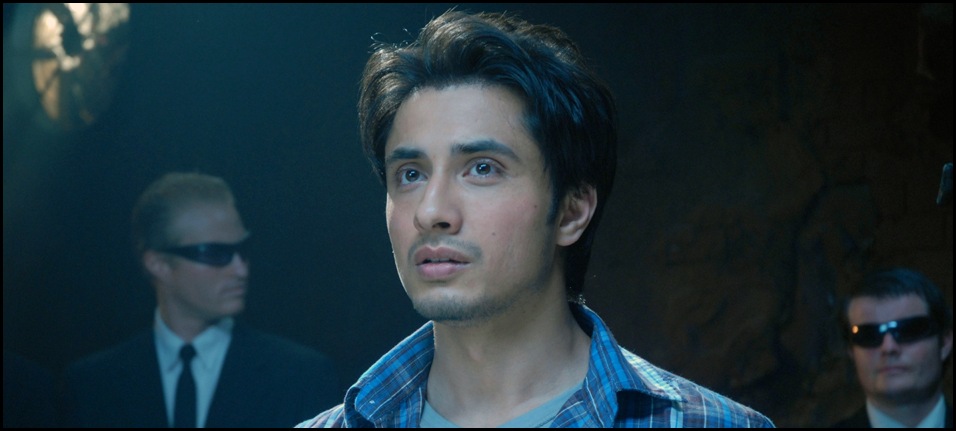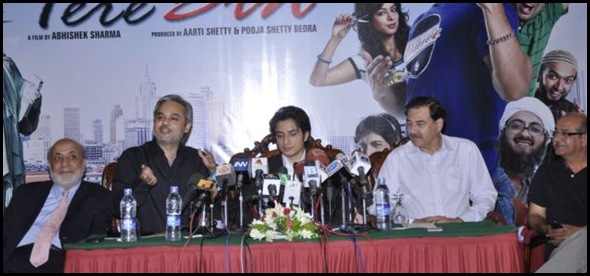The following is the unedited, feature-length review and press coverage published in iMAGES on the 1st of August 2010
Tere Bin without “Laden”
By Mohammad Kamran Jawaid
In the middle of the press conference hosted at Pearl Continental Karachi, Ali Zafar, in sublime drama mode, takes out an easily available bootleg DVD of the banned "Tere Bin Laden", an unoffending farce about a keen-eyed (and opportunist) journalist, an Osama Bin Laden-lookalike and a fake video tape that "might have" fueled the war on terror just a wee bit. Fueling the war or not, the video tape did get the re-titled "Tere Bin" in a flummoxing quandary and got it banned in Pakistan.
As they write in the letter issued to the film’s distributors, the Central Board of Film Censors is "pleased to refuse" a certificate on these grounds: The film is based on a controversial subject and depicts "Usama Bin Laden in a comic way". It also contains "vulgar/objectionable dialogues, abuses and derogatory remarks". And above all, showcases "bad and negative" image of our law enforcing agencies. They didn’t mention the security risk factor.
So tell me this: Has no one in the censor board ever seen a black-comedy in Pakistan. Oops. I take that back. Of course they didn’t.
Has the censor board ever passed a film that contained "vulgar/objectionable" material? No. Of course not. We have a new Bollywood movie out every week.
Ali Zafar didn’t have to take out any DVD’s for dramatic impact (there was none, by the way), because almost everyone has already seen "Tere Bin".
"It’s doing excellent business, despite its run on cable", says my DVD retailer, who was out of stock when a perspiring youth in a motorcycle, big bags hanging from both sides of the steering, skits to a halt and asked for a DVD. The retailer sold out hours ago.
"Tere Bin Laden" – no need to call it by its shortened title since it’s not coming here – is a shrewdly developed mainstream black-comedy-cum-staged-satire set in Karachi. Where? We do not know. Apart from an establishing city shot or two, or of references like "Malir" and "Tower", the movie is shot in closed, raddled, make-shift walls for sets. If you’re wondering is Pakistan this worn-down looking, don’t. The texture is emphatically of a stage-play. Unlike most mainstream ventures, Abhishek Sharma – the debuting screenwriter and director of "Laden" – has heard the term "Mise en scène" (an all-encompassing term referring to everything related to composing a shot – production design, cinematography, blocking the movement of actors).
Sharma skillfully utilizes (read: squeezes) everything out of proven low-budget filmmaking tactics (Zafar says the budget, including the marketing costs a little over Indian 8 Crores). Without the overbearing of a bigger budget – something I believe director Vikram Bhatt understands – Sharma pegs down on close-quartered cinematography (Santosh Thundiiayil – "Kuch Kuch Hota Hai", "Krrish", "Pinjar") and sharply calibrated edits (who, I don’t know. Unfortunately IMDB, Wikipedia and even the official sites don’t mention all the talent involved). Even the casting – for big and bit-parts, cleverly hand-picked as they are – is constricted to speaking-roles.
The tightness is glued together by a strong, thoroughly rehearsed chemistry between the leads, a seamlessly stitched screenplay, punchy, perfectly timed and deliberately underplayed dialogues. The jabs are fast, and the profanity is "implied", and not fully worded-out.
Vulgarities? Obscenities? In my humble opinion: Bull.
The dialogues and the screenplay rely on straight-forward screenwriting elements: Ali Zafar is natural and shining (and a veritable lead material) as Ali Hassan (a little imagination here Mr. Sharma), a regular-Joe youth from Karachi with green-card fantasies. Ali is rejected (read banned, like the movie) multiple times, because of a misapprehended airline incident. He works in a craggy news channel – Danka TV – where the penny-pinching boss – Majeed (an expedient Piyush Mishra) – routinely fills a penalty cookie-jar with employee money. Yes, he is that evil.
One regular contributor is Lateef (Chirag Vohra – sometimes plain-speaking in Bollywood Urdu) – a namaz-topi wearing on-line editor who is befuddled into a scheme of milking a spectacled, Osama Bin Laden lookalike Noora (Pradhuman Singh), a chicken-farmer, fascinated, first by chickens and later by Zoya (Sugandha Garg) – the loose-top wearing make-up artist (do our lower-middle class women wear T-Shirts this loose?) who artistically falsifies Noora into a ditto-copy of Bin Laden.
Now, all that’s left is the lip-sync. Abhishek Sharma logic’s that one cannot be a fluent Arabic reader with the tonal quality of Bin Laden, so he brings in Quereshi (Rahul Singh) a late-night pro-communist-pro-Pakistan radio host. He also mimics celebrities for an encore. The taping is left to Gul (Nikhil Ratnaparkhi), Ali’s sleep-deprived cameraman-cum-idea man, with a natural endowment to sleep anywhere.
Barry John – one of India’s esteemed acting coaches – comes at the interval as Ted, a conferred American intelligence officer, woolgathering to be President, sent to snuff out Osama with bare-breasted tactics (in one scene Ted presents a plan featuring comic book superheroes bombarding Osama out of hiding).
Ok, so a few scenes do fall over each other. Ali Zafar informs me via e-mail, that the contraband available here (or on the internet) has 20 minutes of footage missing. He also writes that the director "made a longer cut but then after feedback he squeezed it down and found it important to get straight to the point which was the making of fake Osama tape".
The result is a compressed take that features only desideratum motivations that push-and-pull characters in place. This automatically creates a lee-way for scenes to fall in place too and makes everyone look superficial who harbor unambiguous sentiments; "Good Looking Ullo Ka Pattha" or not (by the way, that’s one of the two songs that made it into the movie).
"Tere Bin Laden" is produced by Aarti Shetty and Pooja Deora of Walkwater Media. Distributed by Walkwater and BSK Entertainment. Directed and Written by Abhishek Sharma. Cinematography by Santosh Thundiiayil. The music is by Shankar Mahadevan, Ehsaan Noorani and Loy Mendonca with lyrics by Jaideep Sahni, Ali Zafar, Dhruv Dhalla and Jaspreet Singh.
The movie stars: Ali Zafar, Pradhuman Singh, Sugandha Garg, Nikhil Ratnaparkhi, Piyush Mishra, Rahul Singh, Seema Bhargava, Barry John, Chirag Vohra and Chinmay Mandlekar.
It features misplaced pipe-dreams of grandeur inflicting most youths at local chai-walas, and the best, freshest one-lines that only a low-budget comedy can afford. Plus, there is a romantic angle in there. Somewhere.
Routine Q & A, Dinner and a Movie
By Mohammad Kamran Jawaid
22 July – Shalimar Hall, Pearl Continental, Karachi. This is where Ali Zafar and Brand TV’s Asim Qureshi hosted the press briefing for the recently banned "Tere Bin", the so-labeled perpetrator–film that allegedly makes fun of Osama Bin Laden in a comical way, contains vulgarities, profanities, derogatory remarks, and belittles law enforcing agencies. "Tere Bin" – the shortened title which makes it sound like a romantic drama – is perhaps the first film to properly highlight a Pakistani pop-sensation in a Bollywood film debut that’s adamantly set in Karachi.
Along with Zafar and Qureshi, were three representatives with little-to-no speaking parts. Nawab Huzoor-ul-Hassan, Rashid Khwaja and Mohammad Ahmed – the scribe, who Zafar acknowledged had a lot of input in the screenplay.
The press briefing, which was a necessity as both a publicity and propaganda stunt, had another primary reason: to thank the media for their constant, unyielding, support for "Tere Bin" (both Ali Zafar and Asim Qureshi thanked the media every few minutes).
They were bombarded by routine questions. The "What’s", "Why’s" about the banning, and the expected one about the portrayal of the females in "Tere Bin" (why was there just one pivotal character in the movie?).
The briefing wasn’t meant as a spectacle. It didn’t turn into one either – our fellow journalists were more interested in food, as they jumped right out of mid–Q&A session, causing the briefing to come to an abrupt halt.
Sometime in mid–session, Zafar and Qureshi took out bootlegged DVD copies of "Tere Bin Laden" to make their point. "If the movie is banned here, then why are pirated copies so easily available", they asked. At the end, the press had pirated DVD’s as presents.
Ali Zafar really wanted to the film to come here – a prime reason, he states, for setting up his "Ali Films" unit. The Censor Board is worried that might create security issues. Did "My Name is Khan" have the same problem? Apparently not.
I was at the front row. I didn’t ask any "obvious" questions.
When the hubbub was slowing down, I asked Ali Zafar that wouldn’t it be best to release the movie post–Ramadan, if the Censor had issued the license (a big IF). He was undecided about that. "The problem is everyone would have seen the movie by then", he said.
My dear lad, everyone already has.
The published version can be found at:
and


Oh my goodness! an remarkable write-up dude. Thank you However I am experiencing concern with ur rss . Don’t know why Unable to subscribe to it. Is there anybody getting identical rss dilemma? Anyone who knows kindly respond. Thanks
An sich n cooler Kommentar, nur könnt ihr später ein wenig ausführlicher sein? 🙂